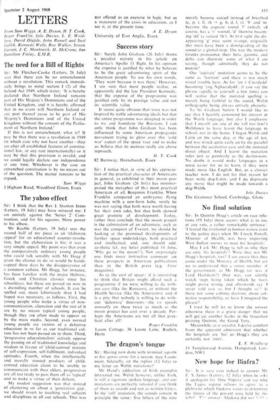The yahoo effect
Sir: I think that the Rev J. Stanton Jeans (Letters, 19 July) may have misread me; I am entirely against the 'Series 2' Com- munion, and for his squares. More power to his elbow.
Mr Keeble (Letters, 19 July) sees the second half of my piece as an 'elaborate appeal' for an educational counter-revolu- tion, but the elaboration is his; it was a very simple appeal. My point was that even the comparatively ordinary young people who could talk sensibly with Mr Hogg if given the chance to do so would be handi- capped these days by the disappearance of a common culture. Mr Hogg, for instance, has been familiar with the major Hebrew, Greek and Christian classics since his schooldays, but these are passed on now in a dwindling number of schools. It can 'be spelled out, more laboriously than I had hoped was necessary, as follows. First, the young people who make a virtue of non- communication, alienation and the rest of it are by no means typical young people; though they are often made to appear so by the mass media. Second, even normal young people are victims of a defective education in so far as our traditional cul- ture has not been passed on to them. Third, 'progressive educationalists' actively oppose the passing on of traditional knowledge and wisdom in favour of 'child-centred' notions of self-expression, self-fulfilment, individual aptitudes. Fourth. when the intellectually and morally stunted products of child- centred education claim to be unable to communicate with their elders, progressives are all too ready to pass them off as 'typical' and to make a virtue of their defects.
My modest suggestion was that instead of chattering on about a 'generation gap*, we should revert to teaching real subjects and disciplines in all our schools. This was not offered as an exercise in logic, but as a statement of the crisis in education, as I see it, at the present time.
A. E. Dyson
University of East Anglia, Essex


































 Previous page
Previous page